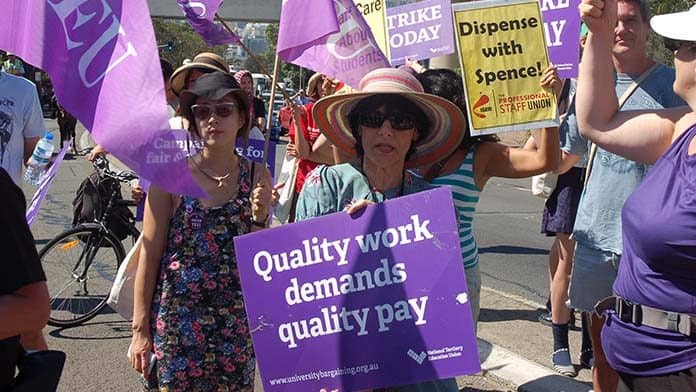Momentum is growing at universities to take collective action to defend our jobs and conditions. In the last month, well over a thousand casual workers were sacked—200 at RMIT, Melbourne University and La Trobe, and similar numbers at many of the other 39 universities. Union Branches across the country are calling for our national and state officials to go on the front foot and mount serious national action to pressure Morrison to fund COVID-19 shortfalls.
The government is hitting the sector’s quarter of million workforce hard on two fronts.
First, Morrison is so far refusing to include universities in its $320 billion COVID-19 bail-out package. The $18 billion funding the government announced for universities is not new money—it is its usual annual contribution to run the sector. Unless Morrison provides another $5 billion—a paltry addition to his bail-out package—21,000 jobs will be lost in the next six months. Larger universities are locked out from accessing the JobKeeper payment as their revenues have not dropped by the required 50 per cent.
In the university sector, the government’s exclusion of casuals and workers on temporary migrant visas from JobKeeper subsidies has a particularly divisive and racist impact. There are thousands of casually employed students as well as many tutors and academics on temporary migrant visas. On all campuses—small or large—none can access JobKeeper, and many miss out on JobSeeker as well. Only a united and militant campaign by all staff can turn Morrison’s racist attack that visa holders “go home” on its head.
These assaults are just the beginning. In the next three years, the COVID-19 crisis is expected to slice revenue by $25-$40 billion—mainly due to the loss of income from the international students the neo-liberal “business models” of universities heavily rely upon.
The Morrison government has opened a second crucial front—giving Vice-Chancellors a big stick to attack wages and conditions in collective agreements. University managers can now force changes to agreements within 24 hours through an emergency staff vote.
Despite being eligible for $50 million in JobKeeper funding, smaller universities such as La Trobe University are already preparing for a quick scare campaign to ram through changes, claiming in an all-staff letter that the crisis means that, “wage-related concessions to save costs, including pay freezes, pay reductions, redundancies and early retirement” are urgently needed.
National officials’ response
The response so far from National NTEU officials has been to buckle on both lines of attack—accepting that Morrison won’t provide COVID-19 funding and that Vice-Chancellors could scare staff into agreeing to major attacks on their jobs, wages and conditions. The NTEU National Executive’s aim has been to soften these attacks by negotiating with universities for a temporary “National Jobs Protection Framework” to vary collective agreements.
Their approach is a disaster. It abandons the 70 per cent of staff in the sector who are employed casually to immediate sackings. It exposes all staff to increased workloads, unpaid work, wage cuts and retrenchment. Crucially, it is an approach that says the union does not have any confidence that members can stand up to these attacks.
Members and activists across the country are rejecting this pessimism. Staff are joining the NTEU in droves. Over a thousand members have attended state-wide union meetings in Victoria and NSW. Hundreds are attending campus-wide Branch meetings looking for ways to be involved in resisting the attacks.
Branches at RMIT, Melbourne, La Trobe, Flinders, Sydney, Victoria University, Sunshine Coast and Monash have voted overwhelmingly to reject giving any concessions that would result in cuts to jobs, pay or conditions. Many are calling for collective action now—to join car cavalcades on 1 May and to organise a militant National Day of Action next month.
UNSW, University of Technology Sydney, La Trobe University, Melbourne University, the University of Sydney and RMIT Branches support these positive and concrete ways to build union strength by increasing public and industrial pressure on Morrison to cover the shortfalls.
Shamefully, the national leadership of the union has ignored these calls and doubled-down on pushing its strategy, asking members in less organised Branches to complete a survey about which conditions in their Collective Agreements they are willing to give up to “save jobs”.
Jobs will not be saved by conceding ground. Hundreds of activists and newly minted NTEU members are debating on Zoom how to move into action. Some left activists are arguing that resistance be focussed solely on getting out the “No” vote on each campus in ballots on agreement variations.
While voting against concessions on pay and conditions is crucial, Solidarity and other NTEU members argue that there are problems with solely focussing on the vote itself. First, it accepts that a political and industrial campaign cannot be built to pressure the Morrison government to include universities in its bail-out.
Second, it sidelines building actions such as joining the 1 May convoy and a National Day of Action—collective activity which actually builds member confidence to vote no, if and when Vice-Chancellors try to force a staff vote. And this in effect means just waiting around for a vote to take place or at best, phone-banking.
Third, building a fighting union to defend jobs, pay and conditions will take more than voting. Taking industrial action will be essential if we are to beat back these attacks. In a time of crisis the old rules restricting legal industrial action to bargaining periods can be challenged if people have built up confidence in taking action first, and the convoys are a good first step. In a welcome development, those activists holding to the “vote no” strategy are beginning to include these arguments in their campaign work.
By Marcus Banks,
NTEU Delegate RMIT
Sign the open letter “Fight the Liberals to fund our universities; Call for a National NTEU Day of Action to save every job” here






